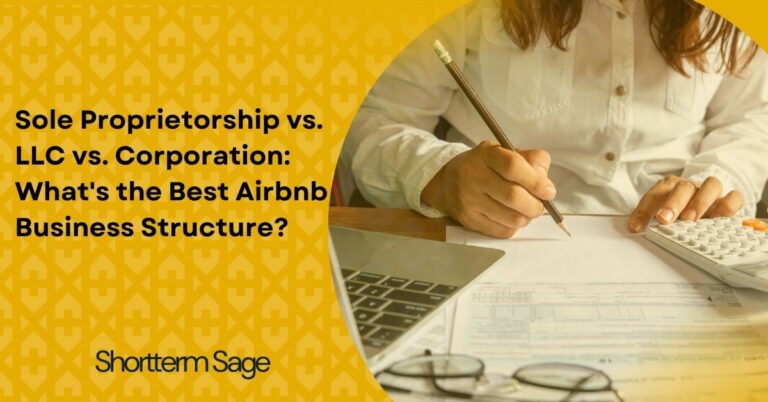
If you’re running a short-term rental and are thinking of growing it into a full-fledged business, you might’ve considered forming an Airbnb business structure.
A sole proprietorship should be okay for just 1 or 2 properties. But if you’re planning on scaling to 3 or more units, and especially if you’re going to start managing other people’s properties, you’ll have to consider a more formal structure such as a limited liability company (LLC) or an S corporation.
The main reason you’ll want to formalize your business entity is that you want to protect your personal assets.
Whenever you operate a business or own real estate, you expose yourself to risks. And operating a short-term rental is no different.
Short-term renting is a lucrative industry and you’re likely going to generate a lot of income. You’ll want to protect your hard-earned money from lawsuits or anyone who might come after your assets.
For example, one of your guests gets injured while staying at your airbnb. They may decide to pursue legal action by filing a negligence or personal injury claim. Without the protection of a company or corporation, your personal assets could be placed at risk. That includes your home, car, bank account, even retirement savings.
Although Airbnb has a liability protection program that covers a host’s liability in an injury, property damage, or any untoward incident during a guest’s stay, a legal business framework will give you added assurance that it’s only your company’s or corporation’s assets that would be liable. Not your wealth.
If you’re using the rental arbitrage model, your business would sound more trustworthy if it were a legally recognized entity. Imagine approaching a property owner and proposing to manage a few of his units. Wouldn’t you sound more believable if you presented yourself as a company or corporation rather than just John Doe?
Read also: Where to Find Landlords that Allow Airbnb Arbitrage
When you formalize your Airbnb business structure through a legal entity, you get to choose from different options on how you’d like to be taxed. Each entity is taxed differently, so you can base your structure on the specific needs and circumstances of your business.
Then, as it scales further, you can decide to convert to another structure that will suit that particular stage of your growing enterprise.

Every business owner and investor has a different situation that requires a different set of guidelines. It’s best you consult a real estate attorney and an accountant who can assess your specific needs and goals.
But know that there are different factors to consider in deciding which legal entity would best suit you. The one you choose will affect most of your operations, from day-to-day management to how much taxes you’ll need to pay, to how you can raise revenue.
It will also decide if and up to how much of your personal assets would be at risk. You’ll want to choose the one that will give you a combination of legal protection as well as benefits.
There are several structures starting entrepreneurs can use. But in this post, we’ll briefly explain the 3 most common ones that rental owners adopt for their vacation rental properties.
A sole proprietorship is the simplest and most common way people set up a small business. It’s an informal, unincorporated entity that will become your business’ “default setting” if you decide not to create a more formal structure.
With this setup, there’ll be no distinction between you as the owner and the business itself. You and your enterprise will be regarded as the same entity. That means all income, expenses and other financial matters will be reported on your tax return, and you’d have to pay that tax accordingly. The government will send you a Form 1099 based on your social security.
It’s the simplest business structure but also the riskiest. If you are sued for anything, you’ll be personally responsible for the debts and liabilities. And your personal assets would be at stake, too — your home, your vehicle, even your savings accounts.
Again, if you’re operating only 1 or 2 listings, a sole proprietorship might be fine. But if you’re going to scale, this setup is not recommended because it won’t give you the legal protection you’ll need for a full-scale enterprise.
LLCs are hybrid organizations that combine the characteristics of a corporation with those of a sole proprietorship or a partnership.
LLCs are separate legal entities from their owners. This means that an LLC can get a tax identification number, open a bank account, and do business under its name.
In an LLC, you as the owner won’t be liable for the company’s debts or liabilities. The business assets will be owned by the company, and any liability it incurs – lawsuits, equipment, depreciation, and bankruptcy – will be the sole responsibility of the business. It won’t affect your personal assets.
Operating an Airbnb through an LLC is one of the most popular methods of short-term renting because it’s fast and easy to set up, simple to maintain, and doesn’t cost too much.
Also, LLCs do not pay taxes. Their profits and losses are passed through to owners, who claim them on their tax returns. If the business gains, it goes on their taxes and raises their liability. If it loses, it goes on the owners’ taxes and lowers their tax liability.
It’s suited for small, startup organizations that have simple business structures. It’s also ideal for business owners who want to pay a lower tax rate than they would with a corporation.
According to the U.S. Small Business Administration, an LLC can also be a good choice for medium or higher-risk businesses, or owners with significant personal assets that they want to be protected.

An S Corporation, also known as Subchapter or Small Business Corporation, has a slightly more complex organizational structure than an LLC. There are also more rules and legalities that it needs to comply with than an LLC.
S corps allow profits, and some losses, to be passed through directly to the owners’ personal income – without being subject to conventional corporate tax rates. The liability of the owners and investors is limited to the value of their investment in the company.
Both the LLC and S corporation structures for Airbnb provide personal asset protection that can shield you from personal liability for business debts.
They also allow you to separate personal expenses from your business expenses. You can open bank accounts, obtain business licenses and permits, hire employees, and enter into contracts under your LLC and corporation. By creating a separate bank account for these entities, your personal expenses won’t be affected. It’ll also make it easier to claim business expenses when taxes are due.
The main difference between LLCs and S corporations comes down to taxes. One advantage of an S corp is that you can be taxed only on your company’s profits. That will allow you to keep your tax level low, and you’ll be able to pass any type of wages that you’d like to pay directly to yourself.
That means you’d be able to pay yourself as an employee. By giving yourself a portion of your revenue as a reasonable salary, you can avoid taxes on the rest of your income.
Also, all LLC income is subject to payroll taxes. But S corporations pay only for Medicare and Social Security.
But one disadvantage of an S corp is the huge amount of paperwork that tax authorities will require you to file. You’d likely need an accountant to help you in this kind of setup.
Business regulations differ from state to state, so be sure to check the startup rules where your rental is located.
Read also: Rental Arbitrage vs. Co-hosting vs. BRRRR vs. Turnkey — 4 Ways to Run Your Airbnb
The above is just a brief overview of the types and benefits of structuring your short-term rental. It is not intended to offer legal counsel.
We encourage you to seek professional advice from a CPA, tax attorney, or financial adviser who can steer you in the direction best suited for you.
And be sure to do your own due diligence. Figure out what’s best for your financial situation and don’t make a final decision until you’ve fully understood all the pros and cons.
Our reviews are made by a team of experts before being written and come from real-world experience. Read our editorial process here.
Some of the links in this article may be affiliate links, which can provide compensation to us at no cost to you if you decide to purchase a paid plan. These are products we’ve personally used and stand behind. This site is not intended to provide financial advice. You can read our affiliate disclosure in our privacy policy.
About the author:
This website is operated and maintained by Short Term Sage LLC. Use of the website is governed by its Terms Of Service and Privacy Policy.
Short Term Sage LLC may link to content or refer to content and/or services created by or provided by third parties that are not affiliated with Short Term Sage LLC. Short Term Sage LLC is not responsible for such content and does not endorse or approve it.
We use cookies to help improve, promote and protect our services. By continuing to use this site, you agree to our privacy policy and terms of use.